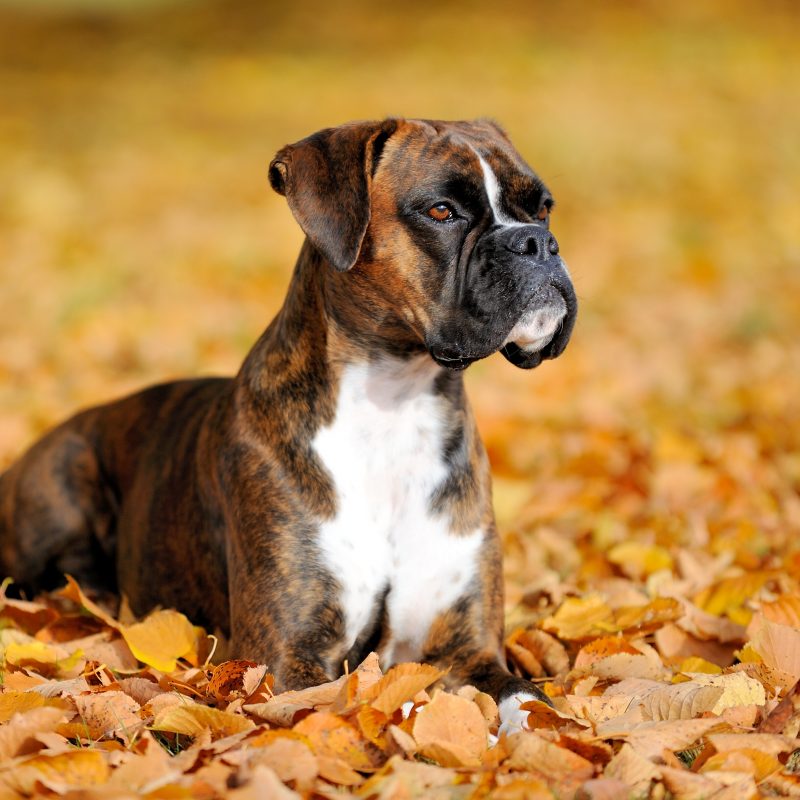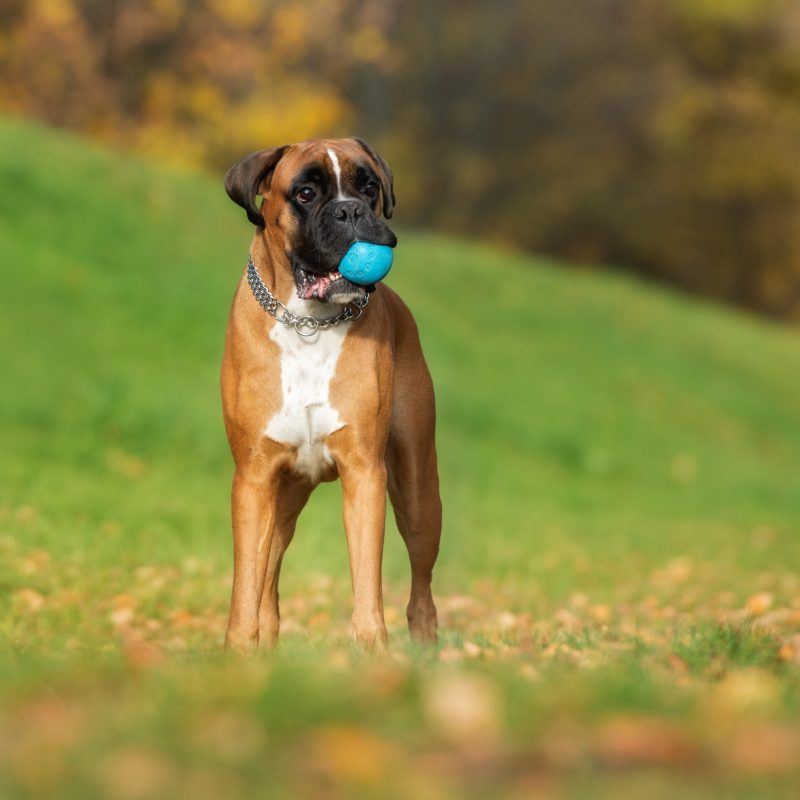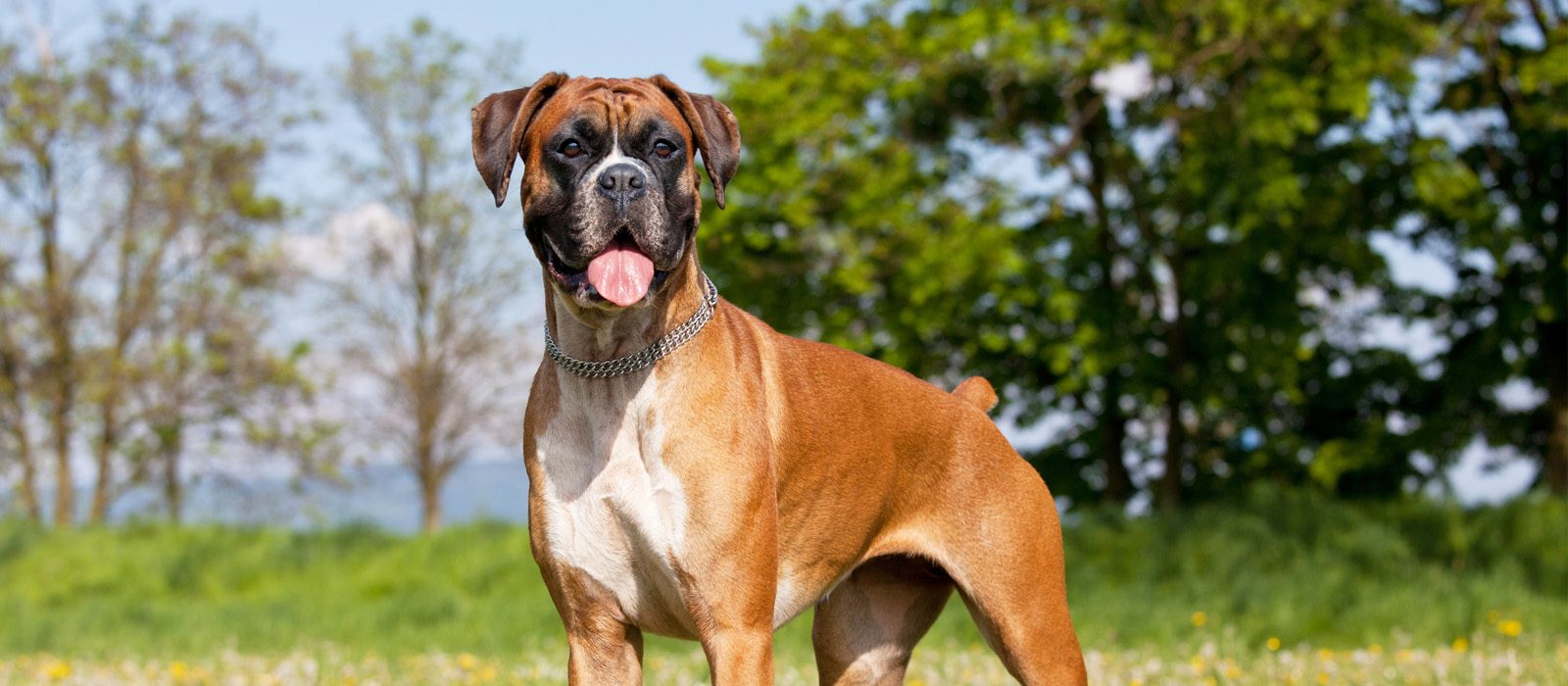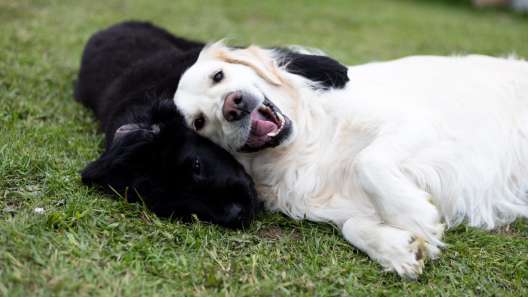-
Activity Level:
high
-
Shedding Level:
low
-
Grooming Level:
low
-
Trainability:
high
-
Good for Novice Owners:
high
-
Adaptability:
moderate
-
Kid/Pet Friendly:
often
-
Prey Drive:
moderate
-
Watchdog:
aware
- Average Size: Medium
- Average Lifespan: 10-12 years
- Registered?: aca, akc


Boxer Dog Breed Information
Overview
Temperament
Adapatability
Health
Owner Experience
Grooming
Activity Level
Size
Life Span
Did You Know?
The Boxer is one of the most popular dog breeds in the United States. It has been recognized by the AKC since 1904. Although the Boxer dog breed originated in Germany, their ancient ancestry can be traced back to the Assyrian empire war dogs of 2500 BC.
The modern Boxer breed we know and love today was originally developed in Germany in the late 1800s. English-bred Bulldogs and the Bullenbesiier were crossed to create an energetic and agile hunting dog to chase wild game.
The Boxer is a popular family companion and a versatile working dog. As a member of the Working Group, Boxers can be found competing in dog sports like agility, obedience, and herding. They also make great service and assistance dogs, as well as therapy dogs, and can be found working as search and rescue dogs, drug detection dogs, police dogs, and military dogs.
The Boxer is a muscular and energetic dog that tends to have a happy, friendly disposition. They bond closely with their families and tend to get along well with children and other dogs. They can even do well with other pets despite their high prey drive if they are socialized and trained with them. With all of this, it’s no surprise one of the facts about Boxers is that they make great family dogs.
As long as they are well-socialized, Boxers are generally upbeat, playful, and friendly. Although they have a natural instinct to protect their family from unwanted visitors, they do tend to warm up once introduced and are happy to make a new friend. They can be prone to barking a lot if you do not work on socialization and training your dog to stop barking early on.
Boxers can be highly adaptable dogs. Although they have a lot of energy and are better suited to homes with yards where they can run, they can adapt to apartment living as long as they get the daily exercise, attention, and mental stimulation they need.
As with any non-arctic dog breed, they are sensitive to very cold temperatures. Boxers are also a brachycephalic breed, which means they are even more sensitive to heat than other dogs. A Boxer is also one of the most affectionate dog breeds. Because they bond so closely with their families and get bored easily, they should not be left alone for long periods of time.
Potential health conditions to be aware of in a Boxer include hip dysplasia, degenerative myelopathy, thyroid issues, and heart conditions like aortic stenosis and cardiomyopathy. Good breeding practices make a big difference and reputable breeders will screen their dogs to avoid passing preventable issues to puppies. So, make sure you are asking the breeder about the health and genetic history of the parents and about any health tests that have been done.
Boxers are intelligent dogs that are eager to please their owners. Despite their energetic personality, they are one of the best dog breeds for first-time owners and are highly trainable dogs. They tend to excel at almost any task put before them!
Because of their open, friendly nature and high energy, they have a tendency to jump up at people in excitement and playfulness. Since they grow into powerful dogs, you will want to make sure you train your dog not to jump up. Don’t be hesitant to enroll in puppy training classes; they can be a useful resource for reinforcing training and can be a great way to socialize and bond with a puppy too.
Boxers have smooth and short coats that will shed a little year-round and require minimal grooming. A brush-down once or twice a week and the occasional bath as needed will keep their short coat healthy and looking great.
In addition to coat care, you will also need to take care of your Boxer’s nails, ears, teeth, and facial wrinkles. Nail trims once or twice a month are usually enough to keep nails from growing too long. Checking ears weekly and carefully cleaning as needed can help prevent ear infections.
Since a Boxer is prone to drooling, it’s not a bad idea to have a drool cloth on hand, especially after they have been drinking water. Checking and wiping their facial wrinkles weekly or a few times a week if your dog is prone to getting into things can help keep their wrinkles clean and free of irritation.
It’s also important to practice good dental care for dogs early and consistently throughout your dog’s life. Dental diseases, like gum disease, are the most common health issues in older dogs because dental care is often overlooked; and, it can lead to other serious health issues. Brushing daily, plus cleanings at the vet when needed, is ideal.
The Boxer is a high-energy dog breed that needs plenty of daily exercise to stay happy and healthy. Daily walks plus playtime, time to run, and other activities are usually enough for them, but they’ll likely be up for more if you are!
Due to their high prey drive and urge to chase, they should only be let off-leash in secure areas. Boxers tend to get bored with repetition, are excellent problem solvers, and are naturally exuberant. These traits, plus their athleticism and versatility, mean they’ll likely enjoy trying a bunch of different activities with you when puppies finish growing and their developing bones won’t be damaged by higher-impact activities.
A fully-grown Boxer usually stands 21-25 inches tall at the shoulder and weighs 50-80 pounds.
Boxers generally live 10-12 years on average.
In Germany, the Boxer was one of the first dog breeds chosen for police training.









